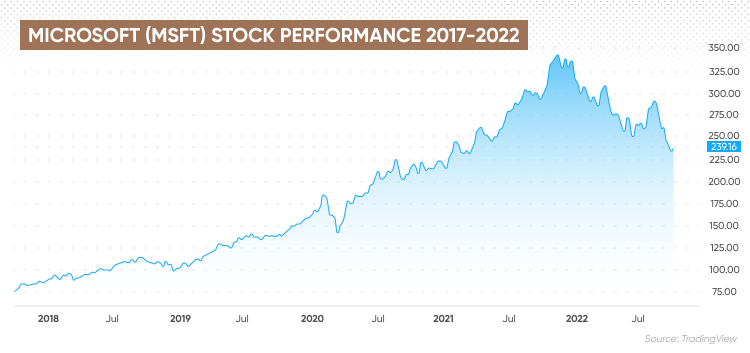Microsoft Stock Price

Microsoft Corporation, one of the technology giants, has been a cornerstone of the stock market for decades. The company’s stock price reflecting its robust position in the market. In this article, we will delve into various factors that influence Microsoft’s stock price, its historical performance, and potential future catalysts.
Table of Contents
ToggleHistorical Performance:
Microsoft’s stock has witnessed remarkable growth over the years, consistently outperforming the market. From its humble beginnings in the 1980s, the company has evolved into a global technology powerhouse. The stock’s journey reflects Microsoft’s ability to adapt to changing market dynamics and consistently innovate.
In recent years, Microsoft’s stock has seen a particularly bullish trend. The company’s strategic shift towards cloud computing with its Azure platform has been a key driver of this growth. The increasing demand for cloud services, coupled with Microsoft’s strong presence in enterprise solutions, has translated into impressive financial results, fueling investor confidence.
Factors Influencing Microsoft’s Stock Price:
- Cloud Computing Dominance: Microsoft’s Azure cloud platform has emerged as a major player in the cloud computing space, competing head-to-head with industry leader Amazon Web Services (AWS). The growing adoption of cloud services across industries has contributed significantly to Microsoft’s revenue, directly impacting its stock price.
- Product Diversification: Beyond its core operating system and office productivity software, Microsoft has successfully diversified its product portfolio. The company’s foray into gaming with Xbox, acquisition of LinkedIn, and expansion into artificial intelligence and augmented reality have broadened its revenue streams, providing investors with confidence in its ability to navigate diverse markets.
- Financial Performance: Microsoft consistently reports strong financial results, with revenue and earnings growth being key indicators for investors. Robust financial health, characterized by healthy cash flows and a solid balance sheet, has a positive impact on stock prices. Quarterly and annual reports play a crucial role in shaping investor sentiment.
- Innovation and Research & Development: Microsoft’s commitment to innovation through substantial investments in research and development (R&D) is a critical factor. New product launches and technological advancements not only drive revenue but also showcase the company’s ability to stay ahead in a rapidly evolving industry.
- Macroeconomic Factors: The overall economic environment, including interest rates, inflation, and global economic conditions, can impact Microsoft’s stock price. Economic downturns may lead to reduced IT spending by businesses, affecting Microsoft’s enterprise-focused revenue streams.
- Competitive Landscape: The technology sector is highly competitive, and Microsoft faces constant challenges from both traditional rivals and emerging players. Investors closely monitor the company’s ability to maintain a competitive edge, innovate, and respond to market dynamics.
- Regulatory Environment: Regulatory changes and antitrust scrutiny can impact Microsoft’s operations and stock price. Investors keep a keen eye on regulatory developments to gauge potential risks and adjust their positions accordingly.
Future Catalysts:
- Artificial Intelligence and Machine Learning: Microsoft’s focus on AI and machine learning presents significant growth opportunities. The integration of intelligent technologies into existing products and services could open up new revenue streams and enhance the company’s competitive position.
- Continued Cloud Expansion: The cloud computing market is expected to grow further, and Microsoft’s Azure is poised to benefit. As the company expands its cloud services and captures a larger share of the market, it could drive future stock price appreciation.
- Strategic Acquisitions: Microsoft has a history of strategic acquisitions, such as LinkedIn and GitHub. Further acquisitions that align with the company’s long-term vision could positively impact its stock price.
- Global Economic Recovery: A broader global economic recovery could lead to increased IT spending by businesses, benefiting Microsoft’s enterprise-focused offerings.
Conclusion:
Microsoft’s stock price reflects a combination of historical performance, current market dynamics, and future growth prospects. The company’s strategic focus on cloud computing, diversified product portfolio, financial strength, and commitment to innovation have contributed to its impressive stock market performance. Investors should continue to monitor both internal and external factors to make informed decisions about their positions in Microsoft stock. As technology continues to evolve, Microsoft’s ability to adapt and lead in key sectors will remain a crucial factor in determining its future stock price trajectory.






